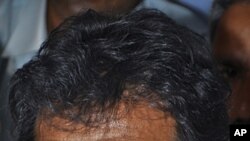Pakistan’s next national elections are not until 2013, but in recent weeks there has been an increase in political campaigning by one famous party leader who hopes to have a big impact on the makeup of the country’s next government.
The emergence of former cricket hero, Imran Khan, as a serious challenger to the ruling Pakistan Peoples Party and its traditional rival, the Pakistan Muslim League-N, has been a dramatic turn for the two parties that have dominated the government in recent years.
Khan’s Pakistan Tehreek-e-Insaf (PTI), or Movement for Justice Party has organized massive anti-government rallies across the country in recent months, each one bigger than the one before.
The latest rally on Sunday in the southern port city of Karachi attracted more than 150,000 people, boosting Khan’s image as Pakistan’s most popular politician and a new political force.
Tens of thousands of people waved party flags and gave the 59-year-old former cricket star a rousing welcome when he arrived to address the crowed.
Imran Khan promised the massive gathering he will bring an anti-corruption revolution and eliminate what he called the “big corruption" in 90 days if his party is elected to power.
The size of the crowd in Karachi surprised many, particularly his political opponents, because the country’s largest city has rarely seen such rallies in recent years.
Despite the impressive rallies, critics such as former ambassador Maleeha Lodhi are skeptical about whether he can translate his popularity to electoral success.
“Election politics is very different from the politics of rallies and demonstrations, but I think it does establish Imran Khan as a major political player on the Pakistani scene," Lodhi said. "And I think that large numbers of young people in his rally also show the yearning for change amongst Pakistan’s youth and the need for the leadership of Pakistan to respond to that yearning of change.”
Marvi Memon is a former member of the national parliament and a staunch critic of the traditional two political parties prevailing in Pakistan. She says it is too early to suggest that Khan’s party will seriously threaten their hold on the national parliament.
“They have a tough challenge for a real change. But yes they have become for sure the third political force in the country. But that does not require, that’s not a difficult task, what is really difficult and what is truly a challenge is actually delivering real political change,” Memon stated.
Khan cemented his national profile in 1992 when he led the national cricket team to win the World Cup. In 1996, he established his political party, but in the years since he has had little success building it into a national party, despite his celebrity. He is the only member of his party to win a seat in parliament.
But the unusually large turnout for his rallies in recent weeks and the defection of some leading politicians are bringing new recognition to his party.
The politicians include three former foreign ministers, two of them belonging to the current ruling party led by embattled President Asif Ali Zardari. The latest defection came last week when a prominent politician, Javed Hashmi, broke with former prime minister Nawaz Sharif’s PML-N party to join Khan’s PTI.
Khan’s critics maintain that despite attracting huge crowds, he has so far failed to present clear policy positions in his speeches.
Analyst Lodhi believes his political influence will depend on whether Khan is able to reach out and construct a credible team to convince voters he will be able to address critical economic, social and security issues facing Pakistan.
“Imran Khan is an iconic figure but up till now Imran Khan has had more fans than supporters. So he has to somehow convert all his fans into supporters and electoral voters," Lodhi noted. "Now we have to wait and see whether he gives a program, whether he begins to take clear cut positions on issues that affect the people.”
One position that Khan has staked out is his opposition to cooperating with the United States to tackle militants based in Pakistan’s volatile northwestern tribal region.
He has campaigned against Pakistan sending troops to conduct anti-militancy operations and has been a staunch critic of U.S. drone strikes on militant hideouts in the border region.
Speaking to VOA, Khan says that collateral damage in the region is fueling militancy in both Pakistan and across the border in Afghanistan because ordinary tribesmen are not part of the extremist groups.
“When there is collateral damage, the only people who benefit are the militants because either the people who lose their family they become militants or they support militants," said Khan. "So, one it is counterproductive, it is creating militancy more militancy, and secondly they [tribal leaders] say that if the drone attacks stop and Pakistani military operations stop and we empowered the people of tribal area they can take care of all terrorism.”
Instead of fighting homegrown Taliban, Imran Khan says the government should initiate a peace dialogue with them. Speaking at the public rally in Karachi, the cricket hero-turned politician promised to solve the problem of militancy if he gains power.




